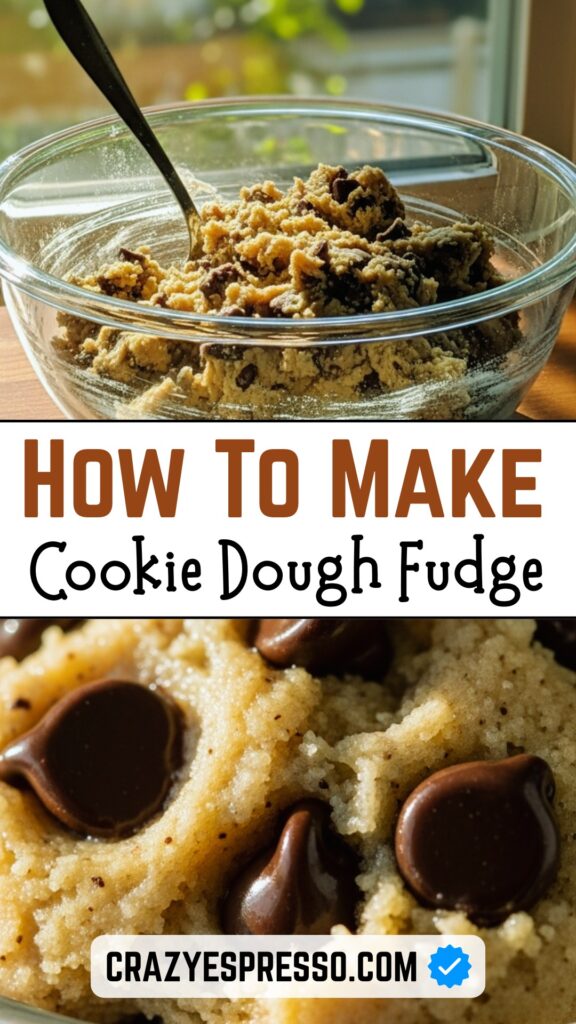Making cookie dough from scratch is one of the most rewarding and comforting things you can do in your kitchen. Whether you are preparing cookies for a holiday, baking with kids, or simply craving something sweet, homemade cookie dough is always better than store-bought.
It allows you to choose the flavors you love, adjust the sweetness, and avoid unnecessary preservatives.
This article will guide you step by step on how to make the perfect cookie dough from scratch.

By the end, you’ll understand the process, the science behind ingredients, and tips for making your dough soft, chewy, or crispy—whichever style you prefer.
Table of Contents
⭐ Why Make Cookie Dough at Home?
Many people assume making cookie dough takes too much time. But the truth is, it only takes about 10–15 minutes to prepare, and the ingredients are basic things you probably already have in your kitchen.
Here are top reasons to make it from scratch:
✔ Fresher Taste
Homemade cookie dough has a richer aroma, better texture, and fresher flavor.
✔ You Can Customize It
Add chocolate chips, nuts, sprinkles, cocoa powder, or anything else you like.
✔ No Preservatives
Store-bought dough often contains preservatives and artificial flavors.
✔ Safe Eating Option
You can easily make edible, no-egg cookie dough for eating raw.
✔ Better Texture & Control
You decide whether your cookies turn out soft, chewy, crunchy, or gooey.
🍪 Basic Ingredients for Classic Cookie Dough
Here is a simple table explaining what each ingredient does.
| Ingredient | Amount | Purpose |
|---|---|---|
| All-purpose flour | 2 ¼ cups | Provides structure |
| Unsalted butter (softened) | 1 cup | Adds richness, softness, flavor |
| Granulated sugar | ½ cup | Sweetness, slight crispiness |
| Brown sugar | 1 cup | Moisture, chewiness, deeper flavor |
| Eggs | 2 large | Binds dough and adds moisture |
| Vanilla extract | 2 tsp | Warm, sweet aroma |
| Salt | ½ tsp | Balances sweetness |
| Baking soda | 1 tsp | Helps cookies rise |
| Chocolate chips | 1–2 cups | Texture & chocolate flavor |
🔪 Tools You Will Need
- Mixing bowls
- Electric mixer or whisk
- Measuring spoons & cups
- Silicone spatula
- Baking tray
- Parchment paper
- Cooling rack
🧑🍳 How to Make Cookie Dough From Scratch – Step-By-Step Guide
Below is the most beginner-friendly method.
Step 1: Soften Your Butter
Do not melt the butter. Softened butter should be:
- slightly warm
- easily pressed with a finger
- still holding its shape
Why? Softened butter traps air when mixed, giving cookies a softer, fluffier texture.
Step 2: Cream Butter and Sugars
In a mixing bowl:
- Add 1 cup softened butter
- Add ½ cup white sugar
- Add 1 cup brown sugar
- Beat for 2–3 minutes until light and fluffy
This step is essential. When you cream butter and sugar correctly, the dough becomes airy and smooth.
Tip: If you skip proper creaming, your cookies may turn flat and greasy.
Step 3: Add Eggs and Vanilla
Add:
- 2 large eggs
- 2 teaspoons vanilla extract
Mix until fully combined. The mixture should look silky and slightly thick.
Note: Do not over-mix once the eggs are added—just combine until smooth.
Step 4: Combine Dry Ingredients
In another bowl, mix:
- 2 ¼ cups all-purpose flour
- 1 teaspoon baking soda
- ½ teaspoon salt
Use a whisk or spoon to distribute everything evenly.
Step 5: Add Dry Mix to Wet Mix
Add the dry ingredients gradually—about one cup at a time.
Mix slowly until the dough comes together.
Important: Stop mixing as soon as the flour disappears. Overmixing can result in tough cookies.
Step 6: Add Chocolate Chips (or Any Add-ins You Like)
Stir in:
- 1–2 cups chocolate chips
Other add-in ideas:
- Chopped nuts
- M&Ms
- White chocolate chunks
- Raisins
- Toffee pieces
- Sprinkles
🧊 Step 7: Chill the Dough (Optional but Recommended)
Chilling the dough for 30 minutes to overnight makes cookies:
- thicker
- chewier
- more flavorful
- less likely to spread
If you want soft, round cookies, chilling is a game changer.
🍪 Step 8: Shape and Bake
- Preheat oven to 350°F (177°C)
- Line baking tray with parchment paper
- Scoop dough using a spoon or cookie scoop
- Leave 2 inches between each cookie
- Bake 10–12 minutes
Cookies should:
- look slightly golden on the edges
- look soft and underbaked in the center
They will continue to cook from residual heat after removal.
🌟 Step 9: Cool the Cookies
Let cookies rest on the tray for 5 minutes, then move them to a cooling rack.
Cooling helps cookies settle and develop perfect texture.
💡 Tips for Perfect Cookie Dough Every Time
1. Always use room-temperature butter
- Cold butter doesn’t mix properly. Melted butter makes dough too runny.
2. Don’t skip chilling
- This creates bakery-style thick cookies.
3. Use more brown sugar for chewy cookies
- Brown sugar adds moisture due to molasses.
4. Don’t over-bake
- Cookies continue cooking after being removed.
5. Measure flour correctly
- Spoon flour into the cup and level it.
- Packing flour too tightly can make cookies dry.
🔥 Variations of Cookie Dough You Can Try
Cookie dough is extremely flexible. You can change one or two ingredients and create a whole new flavor.
1. Double Chocolate Cookie Dough
Replace:
- ¼ cup flour → ¼ cup cocoa powder
Add:
- Dark chocolate chunks
2. Peanut Butter Cookie Dough
Add:
- ½ cup peanut butter
Replace butter to ¾ cup instead of 1 cup
3. Oatmeal Cookie Dough
Replace:
- 1 cup flour → 1 cup oats
Add:
- Raisins
- Cinnamon (optional)
4. Edible No-Bake Cookie Dough
If you want dough that is safe to eat raw, use:
- Heat-treated flour
- No eggs
- Milk (1–2 tbsp) for moisture
🧁 How to Store Cookie Dough
| Storage Method | How Long It Lasts | Notes |
|---|---|---|
| Refrigerator | 3–4 days | Keep in airtight container |
| Freezer (unbaked dough balls) | 2–3 months | Bake from frozen, add 1–2 min |
| Edible dough | 1 week | Must contain no eggs |
🍴 Common Mistakes & How to Avoid Them
Mistake 1: Cookies turning flat
Fix: Chill dough, use room-temperature butter (not melted).
Mistake 2: Cookies too hard
Fix: Use more brown sugar or reduce bake time.
Mistake 3: Dough too sticky
Fix: Add 1–2 tablespoons of flour.
Mistake 4: Dough too crumbly
Fix: Add a splash of milk or melted butter.
✔ Frequently Asked Questions
Can I freeze cookie dough?
Yes! Shape into balls and freeze for later.
Can I eat raw cookie dough?
Raw dough with eggs and untreated flour should not be eaten. Use edible dough recipe instead.
Why do my cookies spread too much?
Warm butter or un-chilled dough causes spreading.
Can I replace butter with oil?
Oil changes texture; butter is recommended for best results.
🎉 Final Thoughts
Making cookie dough from scratch is simple, fun, and incredibly rewarding. With the steps in this guide, even complete beginners can create cookie dough that tastes amazing and bakes perfectly. Remember:
- Cream butter and sugar well
- Add dry ingredients gradually
- Chill the dough for thicker cookies
- Don’t over-bake
Once you master this basic recipe, you can experiment with endless variations and flavors.


